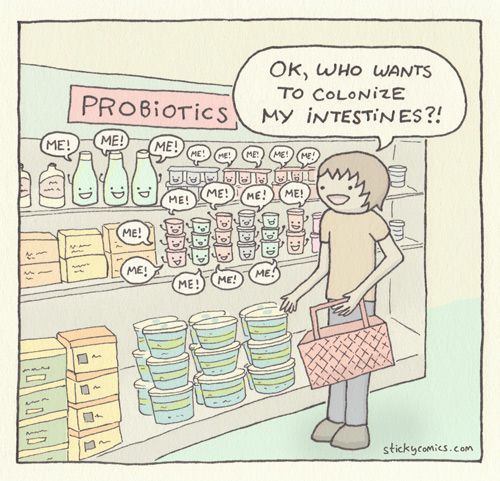There are more bacteria in our guts than there are cells in our body—we’re outnumbered ten to one. These critters—the friendly ones at least—play many important parts, from helping us digest our food to defending against infections to manufacturing neurotransmitters such as serotonin. When the ecosystem of bacteria living in our digestive tract (it’s dubbed the gut microbiome) is healthy—when beneficial bacteria outnumber harmful bacteria—we’re healthy too. But if something throws our microbiome out of balance and the bad guys take over, we end up in a state of dysbiosis. Antibiotics are common culprits, but dysbiosis could also result from diets high in refined sugar, increased use of NSAIDs (aspirin and Advil), travel, contaminated food or water, birth control pills, or steroids.
The gut microbiome is so important to health and immunity that some actually consider it to be an organ. When something is amiss, our bodies are quick to let us know. Signs of dysbiosis include digestive problems (pain, indigestion, bloating, constipation, diarrhea), acne, food and environmental allergies, Irritable Bowel Syndrome, chronic fatigue, brain fog, depression, chronic inflammation, leaky gut—the list goes on, but here’s some good news: the symptoms don’t have to.
Probiotics are live colonies of beneficial bacteria that help level the playing field. Once a beleaguered digestive system is overwhelmed by harmful pathogens, it can be tough to settle the score. Probiotics elbow out the bad bugs by creating a “cloud” of beneficial bacteria that make it tough for the bad guys to keep their numbers up—and numbers is what counts with bacteria.
Probiotics don’t stick around for more than a couple weeks, but they effectively give your gut a chance for its own native colonies to catch their breath and reestablish themselves. The scientific community has confirmed many times over what people taking probiotics have said for years—probiotics can make the difference between health and disease.
How to choose probiotics:
Find strength in numbers. When you’re looking for probiotic supplements, keep an eye out for the cell count. At least 10 billion live cells should do the trick. The better supplements do tests at expiry, so you’re guaranteed a quality probiotic down to the last capsule.
Multiply. Unless you’re fighting a specific battle—Crohn’s treatment might need a different strain of probiotics than allergies, for instance—seek out a multi strain probiotic with a good selection of both Lactobacillus and Bifidobacterium.
Don’t forget about diet! A lot of foods contain probiotics. Sauerkraut is my favourite way to get probiotics through food, since the cabbage is also high in gut-healing L-glutamine.
Prebiotics. Bacteria need to eat, too! A good probiotic will include food for your gut flora in the form of fructooligosaccharides (FOS) and inulin, a fibre that you can’t digest but bacteria love. You can add inulin to your diet with bananas, onions, garlic, and sunchokes—but be careful: some people, especially those with compromised guts, are sensitive to inulin.
Gut imbalances are complex, and often have multiple causes needing multiple solutions. A trained naturopath or nutritionist can help you unravel your body’s clues—symptoms—but ultimately you’re the best detective for your own body. If something’s amiss, chances are it started in your gut.
Darcy Smith
Originally posted at: https://naturalfactors.com/articles/probiotics-your-friends-with-benefits-explained/ and used with permission.

